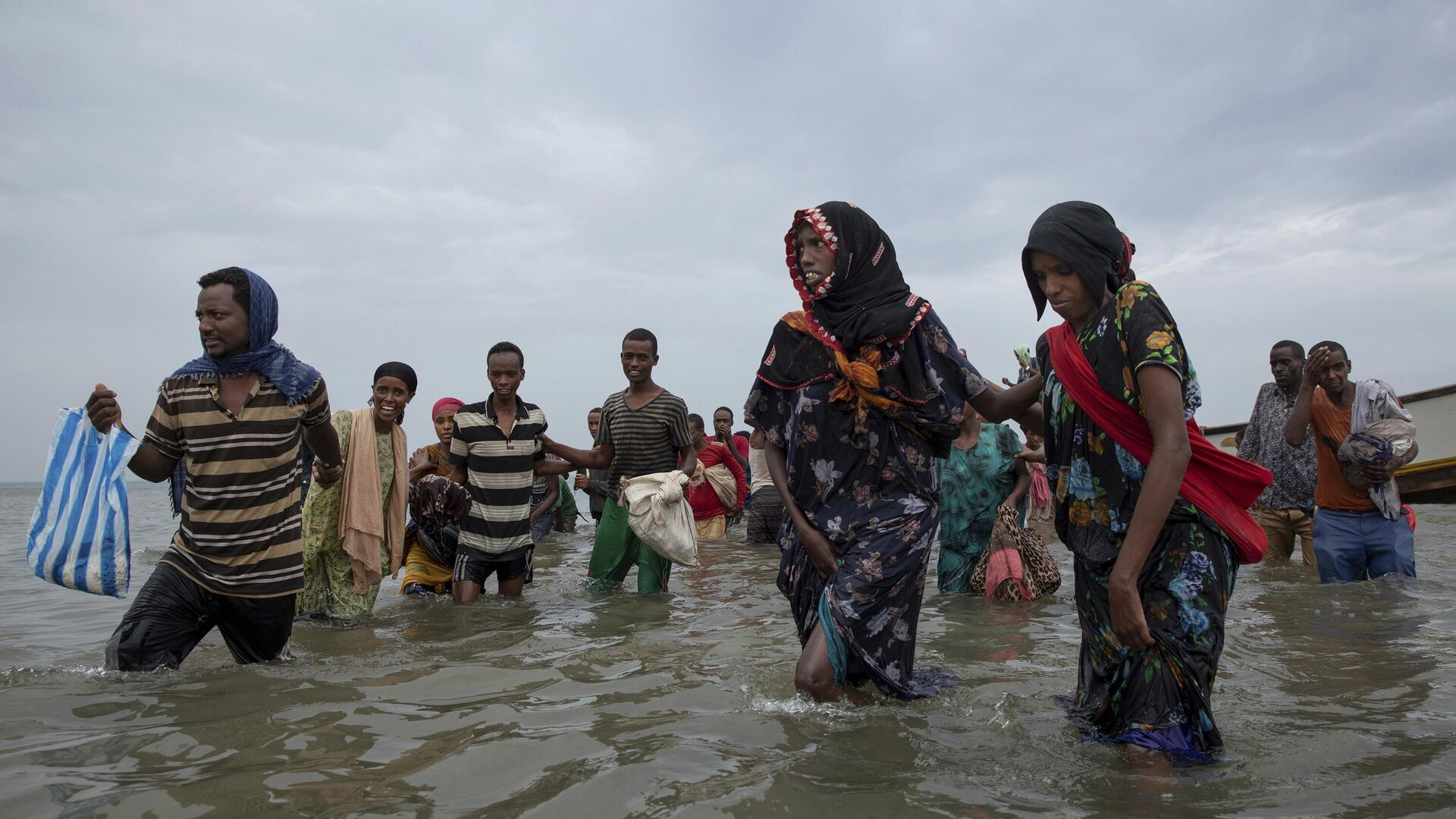https://en.sputniknews.africa/20240331/ethiopia-intends-to-repatriate-70000-of-its-migrants-from-saudi-arabia-1065852212.html
Ethiopia Intends to Repatriate 70,000 of Its Migrants From Saudi Arabia
Ethiopia Intends to Repatriate 70,000 of Its Migrants From Saudi Arabia
Sputnik Africa
In 2017, Saudi Arabia initiated a large-scale airlift operation "to forcibly return" irregular migrants to their home countries in order to address the issue... 31.03.2024, Sputnik Africa
2024-03-31T15:06+0200
2024-03-31T15:06+0200
2024-03-31T15:14+0200
sub-saharan africa
ethiopia
saudi arabia
east africa
international organization for migration (iom)
united nations (un)
crisis
labor
migrants
migration
https://cdn1.img.sputniknews.africa/img/07e8/03/1f/1065854005_0:156:3000:1844_1920x0_80_0_0_f880235b63dad1300941aebcc16d91e7.jpg
Ethiopia is planning to bring back 70,000 of its citizens who have been residing in poor conditions in Saudi Arabia.The decision, which was declared last week in Addis Ababa, will start being implemented in early April.While the government in Addis Ababa does not officially disclose the exact cost of the program, Birtukan stated that it is essential to allocate funds, arrange logistics, and establish shelters for the returnees, the ENA said.The repatriation expenditures will reportedly encompass flight tickets, temporary accommodation at transition centers in Addis Ababa, transportation charges to return to their native regions, and a financial allowance to facilitate the process of rebuilding their lives.In March 2022, Ethiopia and Saudi Arabia reached an agreement to repatriate over 100,000 Ethiopians as Saudi Arabia faced allegations from rights groups regarding its mistreatment and killing of foreign laborers.Furthermore, Ethiopia reportedly didn’t provide clarification regarding the legal status of the returnees from Saudi Arabia in this new scheme. However, previous evaluations conducted by the UN International Organization for Migration (IOM) revealed that the majority of them were either unemployed or engaged in informal, low-skilled employment. For example, in 2023, out of 42,948 registered Ethiopian migrants, 59% were unemployed.The IOM also noted previous hardships that the returnees experienced upon their arrival back in Ethiopia.Ethiopia does not forget about its citizens, even abroad, despite having a significant number of internally displaced persons. Acquired between August and September 2023, the IOM data showed that over 3.45 million individuals were internally displaced in Ethiopia. The report indicated that the primary factors contributing to displacement were conflict (64%), drought (17%), and social tension (9%).Since November 2020, Ethiopia has been engulfed in a fierce internal conflict as the Tigray People's Liberation Front launched a series of attacks on the country's national military bases. In response, the federal government launched an offensive in the northern region.In November 2022, the Ethiopian government and the Tigrayan rebels reached a peace agreement, ending two years of armed conflict.However, last August, a state of emergency was declared in the northern region of Amhara due to the fighting between the regional Fano militia and the Ethiopian armed forces caused by the federal government's attempt to disarm the group and take control over security in the region.This February, the country extended the state of emergency for another four months to cement peace in the region.
https://en.sputniknews.africa/20231101/meta-fueled-violence-in-ethiopias-tigray-conflict-amnesty-international-reports-1063243488.html
ethiopia
saudi arabia
east africa
middle east
Sputnik Africa
feedback@sputniknews.com
+74956456601
MIA „Rossiya Segodnya“
2024
Christina Glazkova
https://cdn1.img.sputniknews.africa/img/07e7/0b/07/1063380906_0:0:673:674_100x100_80_0_0_79628b4d0cd9f29291a57aa13bbf9e7a.jpg
Christina Glazkova
https://cdn1.img.sputniknews.africa/img/07e7/0b/07/1063380906_0:0:673:674_100x100_80_0_0_79628b4d0cd9f29291a57aa13bbf9e7a.jpg
News
en_EN
Sputnik Africa
feedback@sputniknews.com
+74956456601
MIA „Rossiya Segodnya“
Sputnik Africa
feedback@sputniknews.com
+74956456601
MIA „Rossiya Segodnya“
Christina Glazkova
https://cdn1.img.sputniknews.africa/img/07e7/0b/07/1063380906_0:0:673:674_100x100_80_0_0_79628b4d0cd9f29291a57aa13bbf9e7a.jpg
ethiopia, saudi arabia, east africa, international organization for migration (iom), united nations (un), crisis, labor, migrants, migration, migrant crisis, human rights, middle east, international
ethiopia, saudi arabia, east africa, international organization for migration (iom), united nations (un), crisis, labor, migrants, migration, migrant crisis, human rights, middle east, international
Ethiopia Intends to Repatriate 70,000 of Its Migrants From Saudi Arabia
15:06 31.03.2024 (Updated: 15:14 31.03.2024) Christina Glazkova
Writer / Editor
In 2017, Saudi Arabia initiated a large-scale airlift operation "to forcibly return" irregular migrants to their home countries in order to address the issue of unemployment within Saudi Arabia. From May 2017 to June 2023, a total of 558,000 migrants were repatriated to Addis Ababa, according to the UN.
Ethiopia is planning to bring back 70,000 of its citizens who have been residing in poor conditions in Saudi Arabia.
The decision, which was declared last week in Addis Ababa, will start being implemented in early April.
State Minister Birtukan Ayano announced that the repatriation, which is the third of its kind since 2018, will focus on assisting "Ethiopians who are in a difficult situation," the state Ethiopian News Agency (ENA) reported.
While the government in Addis Ababa does not officially disclose the exact cost of the program, Birtukan stated that it is essential to allocate funds, arrange logistics, and establish shelters for the returnees, the ENA said.
The repatriation expenditures will reportedly encompass
flight tickets, temporary accommodation at transition centers in Addis Ababa, transportation charges to return to their native regions, and a financial allowance to facilitate the process of rebuilding their lives.
In March 2022, Ethiopia and Saudi Arabia
reached an agreement to repatriate over 100,000 Ethiopians as Saudi Arabia
faced allegations from rights groups regarding its mistreatment and killing of foreign laborers.
Furthermore, Ethiopia reportedly didn’t provide clarification regarding the legal status of the returnees from Saudi Arabia in this new scheme. However, previous
evaluations conducted by the UN International Organization for Migration (IOM) revealed that the majority of them were either
unemployed or engaged in informal, low-skilled employment. For example, in 2023, out of 42,948 registered Ethiopian migrants, 59% were unemployed.
The IOM also noted previous hardships that the returnees experienced upon their arrival back in Ethiopia.
"Given this sudden and unprepared forced repatriation, the reintegration of Ethiopian returnees has been painfully slow and largely unaddressed. Most returnees face severe difficulties in reintegrating, as they return empty-handed because they used their earnings for living expenses and remittances. Many of them also experienced severe hardships during their stay and during return, causing medical and psychological conditions," the report read.
Ethiopia does not forget about its citizens, even abroad, despite having a significant number of internally displaced persons. Acquired between August and September 2023, the
IOM data showed that over 3.45 million individuals were
internally displaced in Ethiopia. The report indicated that the primary factors contributing to displacement were conflict (64%),
drought (17%), and social tension (9%).
Since November 2020, Ethiopia has been engulfed in a fierce internal conflict as the Tigray People's Liberation Front launched a series of attacks on the country's national military bases. In response, the federal government launched an offensive in the northern region.
In November 2022, the Ethiopian government and the Tigrayan rebels reached a peace agreement, ending two years of armed conflict.
However, last August, a state of emergency
was declared in the northern region of
Amhara due to the fighting between the regional Fano militia and the
Ethiopian armed forces caused by the federal government's attempt to disarm the group and take control over security in the region.
This February, the country
extended the state of emergency for another four months to cement peace in the region.



